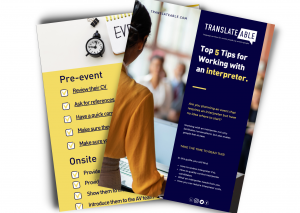English is by far the most commonly spoken language around the world. However, there are some sectors and key services where English is not the main language. Approximately 45% of Spain and 40% of France do not speak English. Even if English is one of their non-native languages, how many of them have a strong enough command of the language to feel comfortable at an event eg attending seminar sessions and engaging with the content? This is where interpreters come into play.
Although vital and even a legal obligation in some cases, what interpretation services entail and their full extent are not always fully understood by event organisers, speakers, etc.
So we are here to kickstart your journey of working with interpreters!
1- What is interpreting and what does an interpreter do?
As with any service or product you are purchasing, first you need to know what you are paying for.
Interpreting can be defined as the act of conveying the message in a spoken or signed conversation from one language into another.
2- What is the difference between interpreting and translation?
It’s important to remember that interpreting is a different discipline from translation, although the two get confused a lot!
Interpreting relates to the spoken word, while translation relates to the written. Just because you can do one, it doesn’t mean you can do the other. A lot of translators do not interpret.
Learn more about 3 things you didnt know about translators.
3- What are the different types of interpreting?
You may be surprised to hear that there is no single approach to interpreting. There are various types of interpreting services available for different needs and event types.
Here are three of the main types of interpreting:
- Simultaneous Interpreting:
This can be done remotely or in person and is often carried out by interpreter teams in booths.
Simultaneous interpreting is often used for events and conferences. It is quite pressured as the interpreter needs to relay the speaker’s message in another language at the exact same time as they listen to what the speaker is saying next. The speaker presents at their normal pace and there’s usually a delay of only 30 seconds or less.
Who said effective multitasking isn’t possible?!
- Consecutive Interpreting:
This can also be done remotely or in person.
Consecutive interpreting is normally used for smaller groups, such as workshops or business meetings. For consecutive interpreting, the speaker talks for a while and the interpreter takes notes. When the speaker pauses, the interpreter delivers their message. This cycle then continues for the duration of the meeting.
- Whispered Interpreting (Chuchotage):
‘Chuchotage’ comes from the French ‘chuchoter’, which means ‘to whisper’. This type of interpreting is normally provided for small groups or individuals and carried out without equipment. It’s often used in meetings or guided tours. The interpreter sits next to their audience and whispers the interpretation.
If you…
- Are in need of interpreting services for the first time and don’t know where to start.
- Have used interpreting services for an event previously but weren’t really satisfied and are currently sceptical.
- Regularly work with interpreters but in need of an interpreting service in a language new to you.
- Simply want to know more about how we work.
… feel free to contact us now at info@translateable.com. We’d be happy to have a chat about how we may assist you with your interpreting needs and more!




